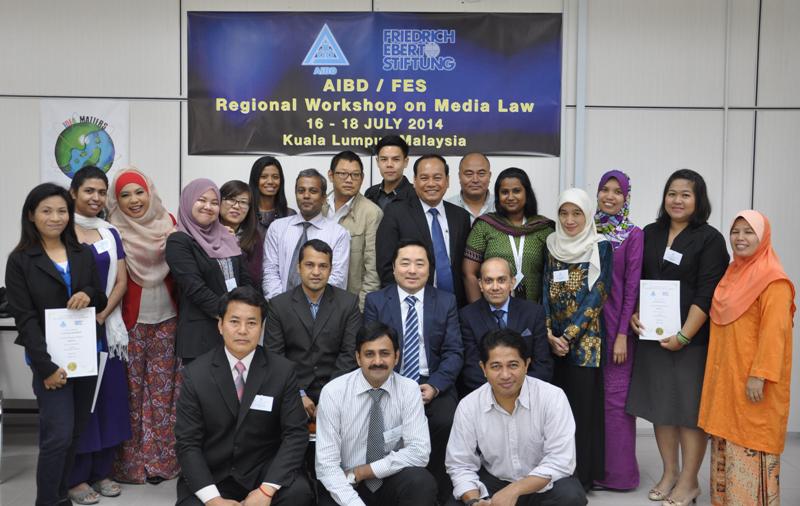Critical issues of law affecting broadcasters and other media professionals were the subject of a 3-day regional workshop organised by AIBD in Kuala Lumpur between 16-18 July 2014. The event, supported by the Friedrich Ebert Stiftung (FES), attracted close to 20 participants representing 7 countries in South and South-east Asia.
Critical issues of law affecting broadcasters and other media professionals were the subject of a 3-day regional workshop organised by AIBD in Kuala Lumpur between 16-18 July 2014. The event, supported by the Friedrich Ebert Stiftung (FES), attracted close to 20 participants representing 7 countries in South and South-east Asia.
The workshop was conducted by Dr Venkat Iyer, a barrister and media law expert from the United Kingdom, who has, over the years, run numerous similar events around the world, and who advises governments and media organisations on legal and ethical issues of relevance to journalists.
Among the topics discussed were: defamation, contempt of court, hate speech, privacy, and obscenity. The workshop maintained a practical focus throughout, and it was aimed at giving participants an understanding of the legal principles, concepts and rules that apply to the practice of journalism on a day-to-day basis.
Those attending raised a number of issues which they had encountered in the course of their work. Some of these issues were country-specific, but many had a pan-Asian resonance that made for interesting exchanges and sharing of knowledge across national boundaries. The discussion encompassed matters touching media ethics as well as law.
A particularly interesting aspect of the workshop were the small group sessions in which participants were required, within small teams, to deal with real and hypothetical case studies at length. The results of the deliberations were subsequently explored in plenary session, with teams being given the opportunity to question each other on a range of issues.
The feedback received from those attending was very positive. It underlined the importance of this somewhat neglected area of training. Compared to many other matters of relevance to broadcasters and other media professionals, law is not usually given the prominence it deserves in relation to structured, periodic training. This neglect has not only proved costly to many media organisations – in terms of having to defend, or sometimes launch, complex and expensive litigation – but it has also had an impact in reputational terms. Far-sighted media organisations, by contrast, have always benefited by investing in media law training on a periodic basis.
AIBD has established an enviable track record in this area for many years now. As well as conducting high-quality workshops and seminars such as the one under discussion, it has published a much-acclaimed Media Law Handbook which continues to be consulted by practitioners around the region and further afield. It is to be hoped that more and more media organisations will recognise the importance of capacity building and professional development in this area in the future.
Media Law in Focus
Critical issues of law affecting broadcasters and other media professionals were the subject of a 3-day regional workshop organised by AIBD in Kuala Lumpur between 16-18 July 2014. The event, supported by the Friedrich Ebert Stiftung (FES), attracted close to 20 participants representing 7 countries in South and South-east Asia.


